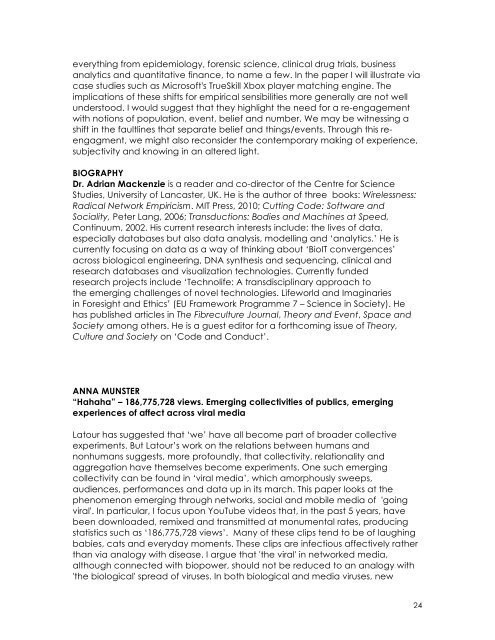main conference abstracts & biographies - University of New South ...
main conference abstracts & biographies - University of New South ...
main conference abstracts & biographies - University of New South ...
You also want an ePaper? Increase the reach of your titles
YUMPU automatically turns print PDFs into web optimized ePapers that Google loves.
everything from epidemiology, forensic science, clinical drug trials, business<br />
analytics and quantitative finance, to name a few. In the paper I will illustrate via<br />
case studies such as Micros<strong>of</strong>t's TrueSkill Xbox player matching engine. The<br />
implications <strong>of</strong> these shifts for empirical sensibilities more generally are not well<br />
understood. I would suggest that they highlight the need for a re-engagement<br />
with notions <strong>of</strong> population, event, belief and number. We may be witnessing a<br />
shift in the faultlines that separate belief and things/events. Through this reengagment,<br />
we might also reconsider the contemporary making <strong>of</strong> experience,<br />
subjectivity and knowing in an altered light.<br />
BIOGRAPHY<br />
Dr. Adrian Mackenzie is a reader and co-director <strong>of</strong> the Centre for Science<br />
Studies, <strong>University</strong> <strong>of</strong> Lancaster, UK. He is the author <strong>of</strong> three books: Wirelessness:<br />
Radical Network Empiricism. MIT Press, 2010; Cutting Code: S<strong>of</strong>tware and<br />
Sociality, Peter Lang, 2006; Transductions: Bodies and Machines at Speed,<br />
Continuum, 2002. His current research interests include: the lives <strong>of</strong> data,<br />
especially databases but also data analysis, modelling and ‘analytics.’ He is<br />
currently focusing on data as a way <strong>of</strong> thinking about ‘BioIT convergences’<br />
across biological engineering, DNA synthesis and sequencing, clinical and<br />
research databases and visualization technologies. Currently funded<br />
research projects include ‘Technolife: A transdisciplinary approach to<br />
the emerging challenges <strong>of</strong> novel technologies. Lifeworld and Imaginaries<br />
in Foresight and Ethics’ (EU Framework Programme 7 – Science in Society). He<br />
has published articles in The Fibreculture Journal, Theory and Event, Space and<br />
Society among others. He is a guest editor for a forthcoming issue <strong>of</strong> Theory,<br />
Culture and Society on ‘Code and Conduct’.<br />
ANNA MUNSTER<br />
“Hahaha” – 186,775,728 views. Emerging collectivities <strong>of</strong> publics, emerging<br />
experiences <strong>of</strong> affect across viral media<br />
Latour has suggested that ‘we’ have all become part <strong>of</strong> broader collective<br />
experiments. But Latour’s work on the relations between humans and<br />
nonhumans suggests, more pr<strong>of</strong>oundly, that collectivity, relationality and<br />
aggregation have themselves become experiments. One such emerging<br />
collectivity can be found in ‘viral media’, which amorphously sweeps,<br />
audiences, performances and data up in its march. This paper looks at the<br />
phenomenon emerging through networks, social and mobile media <strong>of</strong> 'going<br />
viral'. In particular, I focus upon YouTube videos that, in the past 5 years, have<br />
been downloaded, remixed and transmitted at monumental rates, producing<br />
statistics such as ‘186,775,728 views’. Many <strong>of</strong> these clips tend to be <strong>of</strong> laughing<br />
babies, cats and everyday moments. These clips are infectious affectively rather<br />
than via analogy with disease. I argue that 'the viral' in networked media,<br />
although connected with biopower, should not be reduced to an analogy with<br />
'the biological' spread <strong>of</strong> viruses. In both biological and media viruses, new<br />
24



